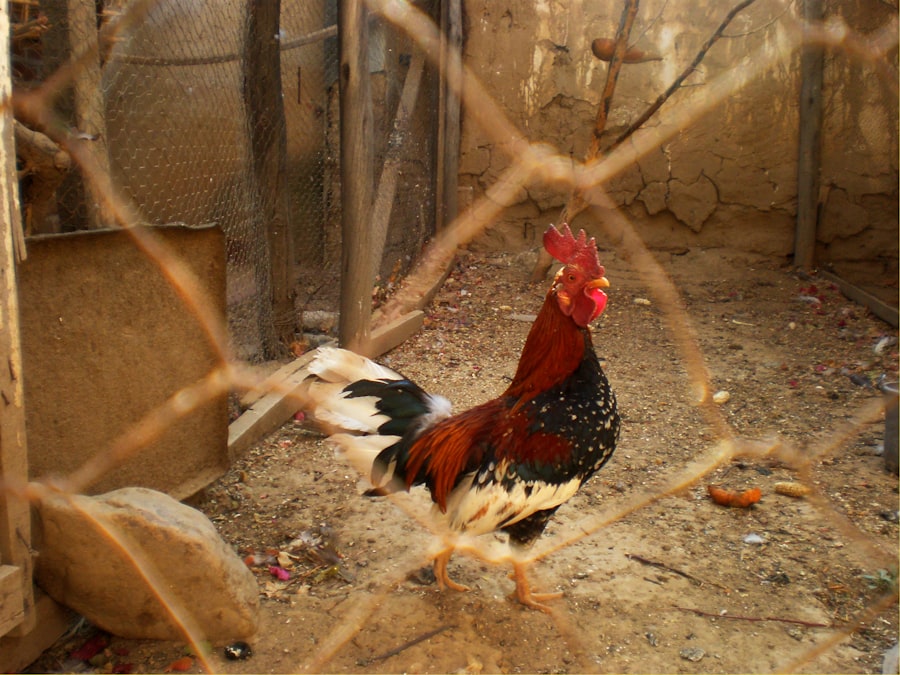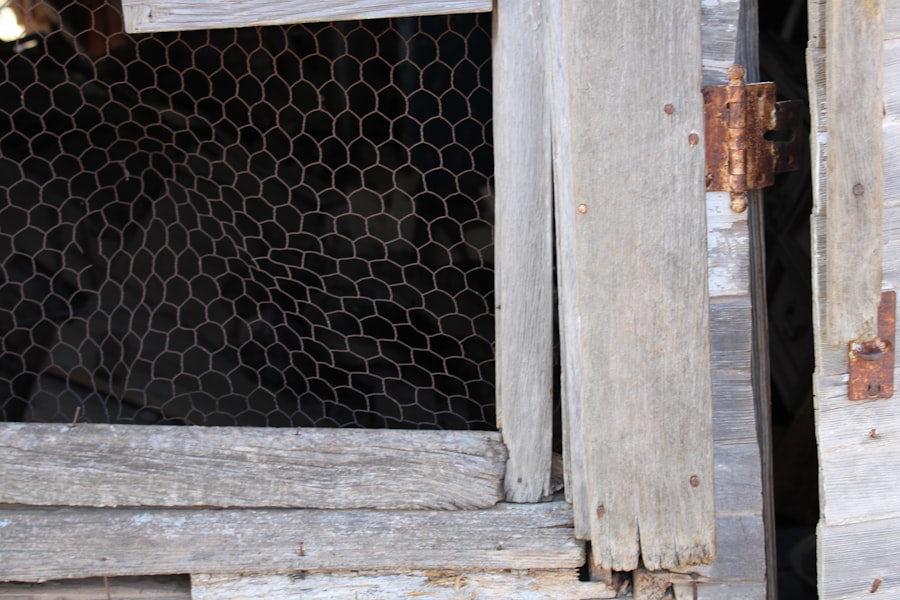Free-range chickens exhibit natural foraging behaviors, actively searching for food, insects, and other items of interest. They possess an innate instinct to roost in elevated locations, such as trees or structures, as a means of protection from predators. These behavioral traits can lead chickens to explore human-occupied areas, including porches, particularly if they discover food or shelter in these spaces.
A comprehensive understanding of these natural behaviors is essential when addressing the issue of chickens frequenting porches. The social structure within a chicken flock is characterized by a hierarchical pecking order, where dominant birds assert authority over subordinates. This social dynamic can influence the movement patterns of the flock, with dominant individuals potentially leading others to explore new areas, including porches.
Chickens are also creatures of habit, easily influenced by routine and environmental cues. If they have previously found food or shelter on a porch, they are likely to return to that location repeatedly. Recognizing these behavioral characteristics is crucial in developing effective strategies to deter chickens from accessing porches.
Table of Contents
- 1 Implementing Physical Barriers to Keep Chickens off the Porch
- 2 Providing Alternative Roosting and Foraging Areas
- 3 Using Repellents to Deter Chickens from the Porch
- 4 Training Chickens to Avoid the Porch Area
- 5 Consistently Monitoring and Redirecting Chicken Behavior
- 6 Seeking Professional Assistance if the Issue Persists
- 7 FAQs
Key Takeaways
- Free range chickens are naturally curious and will explore their surroundings, including porches and other human living spaces.
- Physical barriers such as fences and gates can be effective in keeping chickens off the porch and out of unwanted areas.
- Providing alternative roosting and foraging areas can redirect chickens’ natural behavior away from the porch.
- Repellents such as citrus peels or commercial products can deter chickens from approaching the porch.
- Training chickens to avoid the porch area can be achieved through consistent redirection and positive reinforcement.
- Consistently monitoring chicken behavior and redirecting them when necessary is key to maintaining boundaries.
- If the issue persists, seeking professional assistance from a veterinarian or animal behaviorist may be necessary to address the problem effectively.
Implementing Physical Barriers to Keep Chickens off the Porch
Installing Fences and Gates
One effective way to keep free-range chickens off the porch is by implementing physical barriers. This can include installing fences or gates around the porch area to prevent chickens from accessing it. The barriers should be tall enough to prevent the chickens from flying or jumping over them, and sturdy enough to withstand their attempts to scratch or peck at them.
Sealing Gaps and Openings
Additionally, it’s important to ensure that there are no gaps or openings that chickens can squeeze through. Another option is to use netting or wire mesh to cover open areas or gaps where chickens may enter. This can be particularly useful for areas with overhanging roofs or balconies where chickens may roost.
Effective Deterrent
By creating physical barriers, you can effectively deter chickens from accessing the porch and encourage them to find alternative roosting and foraging areas.
Providing Alternative Roosting and Foraging Areas

In order to redirect the behavior of free range chickens away from the porch, it’s important to provide alternative roosting and foraging areas. This can be achieved by setting up designated roosting poles or structures in other areas of the property where chickens are allowed to roost. These structures should be elevated and secure, providing chickens with a safe and comfortable place to perch and rest.
In addition, creating designated foraging areas with loose soil or mulch can encourage chickens to explore and scratch for food in a different location. Scatter food and treats in these areas to attract the chickens and reinforce the idea that this is a preferred foraging spot. By providing alternative roosting and foraging areas, you can redirect the natural behaviors of free range chickens away from the porch and towards more suitable locations on the property.
Using Repellents to Deter Chickens from the Porch
Another strategy for keeping free range chickens off the porch is to use repellents that deter them from approaching the area. There are various natural and commercial repellents available that can be effective in discouraging chickens from roosting or foraging on the porch. These repellents often have strong scents or tastes that are unpleasant to chickens, causing them to avoid the treated areas.
Natural repellents such as citrus peels, garlic, or hot pepper spray can be applied to the porch area to create an unpleasant environment for chickens. Commercial products like bird repellent sprays or granules can also be used to create a barrier that deters chickens from approaching the porch. It’s important to reapply these repellents regularly, especially after rain or heavy winds, to maintain their effectiveness.
Training Chickens to Avoid the Porch Area
Training free range chickens to avoid the porch area can be a challenging but effective long-term solution. This can be achieved through positive reinforcement training, where chickens are rewarded for staying away from the porch and redirected towards alternative areas. Treats and food can be used as incentives to encourage chickens to stay in designated roosting and foraging areas.
Additionally, using visual or auditory cues such as flags, wind chimes, or scarecrows near the porch can help deter chickens from approaching the area. These cues create a sense of unease or discomfort for the chickens, making them less likely to venture onto the porch. Consistency is key in training chickens, so it’s important to reinforce the desired behavior regularly and provide clear signals that indicate where they are allowed to roam.
Consistently Monitoring and Redirecting Chicken Behavior

Understanding Chicken Behavior
By staying vigilant and attentive to their actions, you can intervene early and prevent chickens from establishing a habit of roosting or foraging on the porch.
Redirecting chicken behavior involves actively guiding them towards alternative roosting and foraging areas through gentle herding or encouraging them with treats and incentives.
Redirecting Chicken Behavior
It’s important to be patient and persistent in this process, as changing established behavior patterns takes time and consistent effort.
Effective Deterrents
By consistently monitoring and redirecting chicken behavior, you can effectively discourage them from accessing the porch and encourage them to explore other areas of the property.
Seeking Professional Assistance if the Issue Persists
If despite your best efforts, the issue of free range chickens on the porch persists, it may be necessary to seek professional assistance. A professional animal behaviorist or poultry expert can provide valuable insights and guidance in addressing the behavior of free range chickens. They can assess the specific dynamics within your flock, identify underlying reasons for their attraction to the porch, and recommend tailored strategies for managing their behavior.
In some cases, it may also be necessary to consult with a pest control specialist who has experience in dealing with nuisance wildlife on residential properties. They can offer solutions such as installing exclusion barriers or using advanced repellent techniques that are specifically designed to deter chickens from accessing certain areas. By seeking professional assistance, you can gain access to specialized knowledge and resources that can help effectively resolve the issue of free range chickens on the porch.
In conclusion, addressing the behavior of free range chickens on the porch requires a comprehensive understanding of their natural instincts and social dynamics within a flock. Implementing physical barriers, providing alternative roosting and foraging areas, using repellents, training chickens, consistently monitoring their behavior, and seeking professional assistance are all valuable strategies in managing this issue. By combining these approaches and adapting them to suit your specific circumstances, you can effectively deter free range chickens from accessing the porch and encourage them to explore more suitable areas on your property.
If you’re looking for more tips on keeping chickens, you might want to check out this article on A-Frame Chicken Coops. It provides valuable information on how to build a coop that will keep your chickens happy and contained, preventing them from wandering onto your porch.
FAQs
What are free range chickens?
Free range chickens are poultry that are allowed to roam freely and forage for food, as opposed to being confined to a coop or small enclosure.
Why do free range chickens come onto the porch?
Free range chickens may come onto the porch in search of food, shelter, or simply out of curiosity. They are naturally curious and may explore different areas of their environment.
How can I keep free range chickens off the porch?
There are several methods to keep free range chickens off the porch, including using physical barriers such as fences or gates, using repellents such as citrus peels or vinegar, and providing alternative areas for the chickens to forage and explore.
Are there any natural deterrents to keep free range chickens off the porch?
Yes, there are natural deterrents that can be used to keep free range chickens off the porch. Some examples include planting prickly bushes or using natural scents such as citrus or mint to deter the chickens from coming onto the porch.
Is it important to keep free range chickens off the porch?
It can be important to keep free range chickens off the porch, as they may cause damage to the area or create a mess. Additionally, some people may not want chickens on their porch for hygiene or safety reasons.
Meet Walter, the feathered-friend fanatic of Florida! Nestled in the sunshine state, Walter struts through life with his feathered companions, clucking his way to happiness. With a coop that’s fancier than a five-star hotel, he’s the Don Juan of the chicken world. When he’s not teaching his hens to do the cha-cha, you’ll find him in a heated debate with his prized rooster, Sir Clucks-a-Lot. Walter’s poultry passion is no yolk; he’s the sunny-side-up guy you never knew you needed in your flock of friends!







